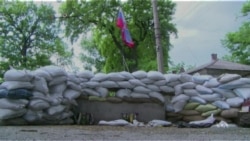WASHINGTON —
Ukraine's new president is negotiating with Russia to try to end the violence in eastern Ukraine, where pro-Russian separatists refuse to relinquish their positions. The United States is urging Moscow to do its part by preventing a flow of fighters across Russia's border into Ukraine.
In Ukraine's restive Donetsk region, pro-Russian separatists refuse to relinquish control to the country's newly-elected government.
"The city's government is handled by us. Our politicians are involved. We are representatives of the armed forces and we are responsible for maintaining order and not the transfer of power," said Andrei, the chief of the rebels in the coastal city of Mariupol.
When Ukrainian businessman Petro Poroshenko won the presidential election two weeks ago, he called for an immediate withdrawal of Russian support for the rebellion in eastern Ukraine. He also pledged to establish dialogue with the Russian-speaking population there.
U.S. lawmaker Marcy Kaptur, who attended Poroshenko's inauguration Saturday, said his offer to the separatists was generous.
"He put out the olive branch for peace, talking about sitting down to negotiate a settlement and giving amnesty to those who have been involved in separatist movements. So he laid it out there and now his administration will have to work toward these ends," said Kaptur.
Russian President Vladimir Putin and Poroshenko met on the sideline of the 70th anniversary of the D-Day in Normandy on Friday. Spokeswoman for the U.S. State Department Marie Harf on Monday praised that as a good sign.
"We were encouraged that President Putin spoke with President Poroshenko in Normandy on Friday, that Russia returned its ambassador to Ukraine for its inauguration, and we would welcome President Putin's comment that he will take action to secure the border between Russia and Ukraine more effectively to prevent the flow of armed fighters and weapons," said Harf.
Violence in eastern Ukraine has not stopped following the elections. Former U.S. Ambassador to Russia Thomas Pickering blames that on Russia. He said the new government must disarm the rebels as soon as possible, but also offer them a place in Ukraine.
"And there is certainly an absolute necessity for Ukraine to be a country of majority rule, but [with] full observance of minority rights, and we have to get the weapons out of the picture as quickly and, I think, as patiently, and perhaps as adamantly as we can," said Pickering.
President Poroshenko has also begun negotiations to resolve long-standing energy disputes between his country and Russia.
In Ukraine's restive Donetsk region, pro-Russian separatists refuse to relinquish control to the country's newly-elected government.
"The city's government is handled by us. Our politicians are involved. We are representatives of the armed forces and we are responsible for maintaining order and not the transfer of power," said Andrei, the chief of the rebels in the coastal city of Mariupol.
When Ukrainian businessman Petro Poroshenko won the presidential election two weeks ago, he called for an immediate withdrawal of Russian support for the rebellion in eastern Ukraine. He also pledged to establish dialogue with the Russian-speaking population there.
U.S. lawmaker Marcy Kaptur, who attended Poroshenko's inauguration Saturday, said his offer to the separatists was generous.
"He put out the olive branch for peace, talking about sitting down to negotiate a settlement and giving amnesty to those who have been involved in separatist movements. So he laid it out there and now his administration will have to work toward these ends," said Kaptur.
Russian President Vladimir Putin and Poroshenko met on the sideline of the 70th anniversary of the D-Day in Normandy on Friday. Spokeswoman for the U.S. State Department Marie Harf on Monday praised that as a good sign.
"We were encouraged that President Putin spoke with President Poroshenko in Normandy on Friday, that Russia returned its ambassador to Ukraine for its inauguration, and we would welcome President Putin's comment that he will take action to secure the border between Russia and Ukraine more effectively to prevent the flow of armed fighters and weapons," said Harf.
Violence in eastern Ukraine has not stopped following the elections. Former U.S. Ambassador to Russia Thomas Pickering blames that on Russia. He said the new government must disarm the rebels as soon as possible, but also offer them a place in Ukraine.
"And there is certainly an absolute necessity for Ukraine to be a country of majority rule, but [with] full observance of minority rights, and we have to get the weapons out of the picture as quickly and, I think, as patiently, and perhaps as adamantly as we can," said Pickering.
President Poroshenko has also begun negotiations to resolve long-standing energy disputes between his country and Russia.





